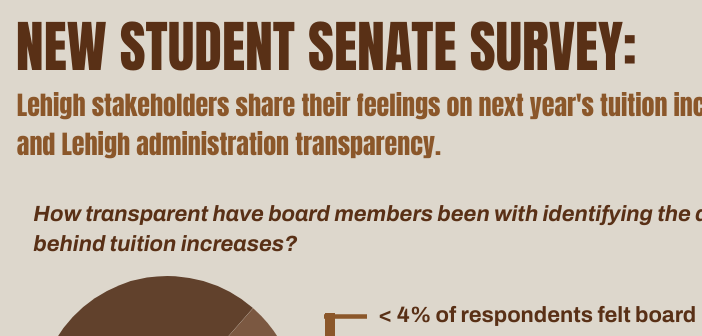Following the announcement of Lehigh’s 4 percent tuition increase for the upcoming 2021-2022 academic year, a group from Student Senate met with Pat Johnson, vice president for finance and administration, and Provost Nathan Urban to relay community concerns and share survey data emphasizing disapproval of the increase.
Trevor Ballingall, ‘23, a member of Student Senate, said the Board of Trustees also received an invitation to the meeting but did not respond.
The student senators went into the meeting seeking to roll back the tuition increase and to improve transparency in the decision making, Ballingal said. He said their motivation to see this change came in part from the feedback survey results the Senate has been collecting.
They did not achieve their initial goal of stopping the tuition increase for next year, as the increase has already been finalized.
“Our reason for asking for it is out of genuine fear and worry and financial anxiety,” Ballingall said.
The survey Student Senate created was completed by 810 students, parents and alumni. Of the group, 87 percent were Lehigh students.
In a question asking how likely they would be to recommend Lehigh to a high school student based on value for money, 86.4 percent responded that they were either “extremely unlikely, unlikely” or “indifferent.”
“It’s a concern for me anytime somebody says something they wouldn’t recommend Lehigh,” Urban said.
Urban said he was surprised by this data and said Lehigh prides itself on having many families attending, whether it be from one generation to the next, or through siblings brought in by recommended experiences.
Aryaan Saigal, ‘21, said he would recommend Lehigh to a high schooler.
“I know it’s getting more and more expensive, but I think that’s also across the board with college tuition in general,” Saigal said. “Whether or not you believe the actual education in classes is worth the price, I think just the alumni network and obviously, in my experience through recruiting and things like that, it’s definitely a leg up compared to other schools.”
Ballingall said the price has been increasing while Lehigh’s rank has not. In 2015 Lehigh was ranked No. 40 on U.S. News list of colleges and universities, while today Lehigh holds No. 49 on the same list.
The total cost of attendance at Lehigh in 2015 was $58,510 and it will be approximately $73,250 in the upcoming year.
“They think they could probably have their tuition so high because they’re a private institution, and because of the name, Lehigh,” said Alexa Char, ‘22.
In another question from the survey, 96.1 percent of respondents said there was “no transparency,” or “lacking transparency,” regarding communication about the increase.
When it came to the most recent tuition increase, Ballingall said no students were aware until it was final. Once it was public and there was pushback from the Senate, the increase was too late to turn around.
“One of the actual things that we’re looking for is this idea of how students can be involved in the conversations that are taking place prior to when the decision is final,” Ballingall said.
Urban said that in the timeframe these decisions are made, it is not possible to go back and modify them afterward.
When it comes to being transparent about how the money is being spent, whether it be on new hires, or improvements to classrooms, or investments in buildings, Urban recognizes the potential to improve.
“I think we certainly can do more to talk about, not just when those things are planned, but when those things are completed,” Urban said. “Certainly there can be more communication and we are completely open to having more communication.”
In the feedback survey, when asked if they have ever raised financial concerns with Lehigh, 62.1 percent of those taking it said they were either “extremely unsatisfied,” “unsatisfied” or “indifferent” with the response they received.
In attempts to address financial concerns previously due to the pandemic, tuition was frozen for the current academic year despite a 4 percent increase being initially planned and a 10 percent discount being offered to students who opted to be fully remote.
“My understanding of it was all about recognizing some of the challenges that students and families were facing in the pandemic and recognizing that we wanted to do as much as we could to try and prevent the cost from increasing in a way that would cause significant problems for students,” Urban said.
Lehigh meets 100 percent of demonstrated financial need for students and Urban said they have invested somewhere in the range of $135 to $138 million this year for financial aid.
“This year we’re hopefully emerging from the pandemic, the economy has largely recovered, unemployment is down to 6 percent, stock market it’s at all time highs,” Urban said. “So, we think that we’re in a situation where, hopefully overall, people are in a better position financially, and yet we still I’m sure will get requests for additional financial aid because there are people who are struggling.”
In the pool of survey respondents, 94.5 percent said they were either “extremely unlikely,” “unlikely” or “indifferent” toward making a charitable donation to Lehigh based on their experience.
Saigal said that he is not opposed to the idea of making donations in the future.
“I definitely keep in touch with professors I used to have. So, I think just like giving back to those connections that I made would definitely be worth it,” he said.
Anna Erickson, ‘24, meanwhile, said she is unsure if she would ever donate to the university.
“It depends on how my next three years are going to go,” Erickson said. “If this has just been a precursor to what the administration is gonna look like for the rest of my time here, definitely not.”
Ballingall said the survey results included 350 paragraphs written by angry students, family and alumni expressing their dissatisfaction.
Another point of contention was the university’s $12 million budget surplus announced shortly after the tuition increase.
Ballingal said the administration should not expect students to be OK with the situation when they are seeing Lehigh has a surplus in money but are being asked to pay more at the same time.
“You have 5,200 undergrad students, and if they’re each paying 2,200 additional dollars next year, that’s $11 million. That can be completely offset by a $12 million budget surplus if you do the math,” Ballingall said.
Johnson said the surplus is a forecast, and not a present actuality.
Urban also said when decisions were being made about tuition, there were still a lot of unknowns about the money coming in and said there are significant costs that offset some of that surplus.
Johnson said with the increase in tuition, they would like to start hiring people again, paying people their merit increases and reinstating the retirement benefits.
“I think we have to recognize that the students five years ago and 10 years ago were in the same situation, or some things that they contributed to only are benefiting students now,” Urban said. “I think we’re always in that situation in a university because we’re doing things for the long term that we’re always to some extent paying it forward.”






Comment policy
Comments posted to The Brown and White website are reviewed by a moderator before being approved. Incendiary speech or harassing language, including comments targeted at individuals, may be deemed unacceptable and not published. Spam and other soliciting will also be declined.
The Brown and White also reserves the right to not publish entirely anonymous comments.
1 Comment
Private businesses furloughed employees in March of 2020 & cut salaries of higher paid management. Lehigh did virtually nothing for months & only then stopped paying merit increases.
Faculty & salaried staff are grossly overpaid relative to the local market. All of this while also getting a PPP loan yet deciding to raise tuition to cover their lack of management.
Not surprised by the survey results.